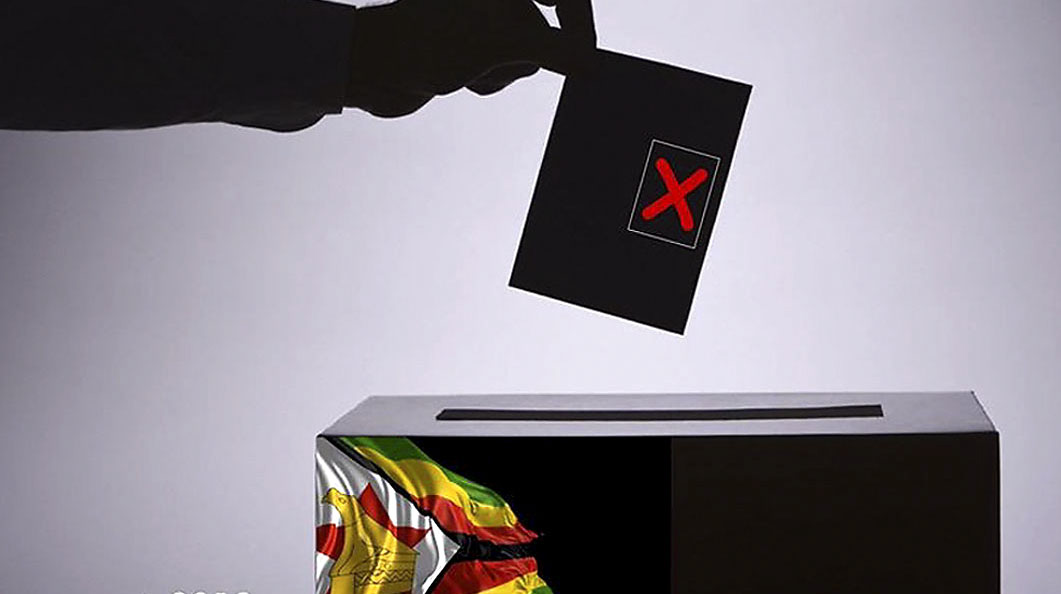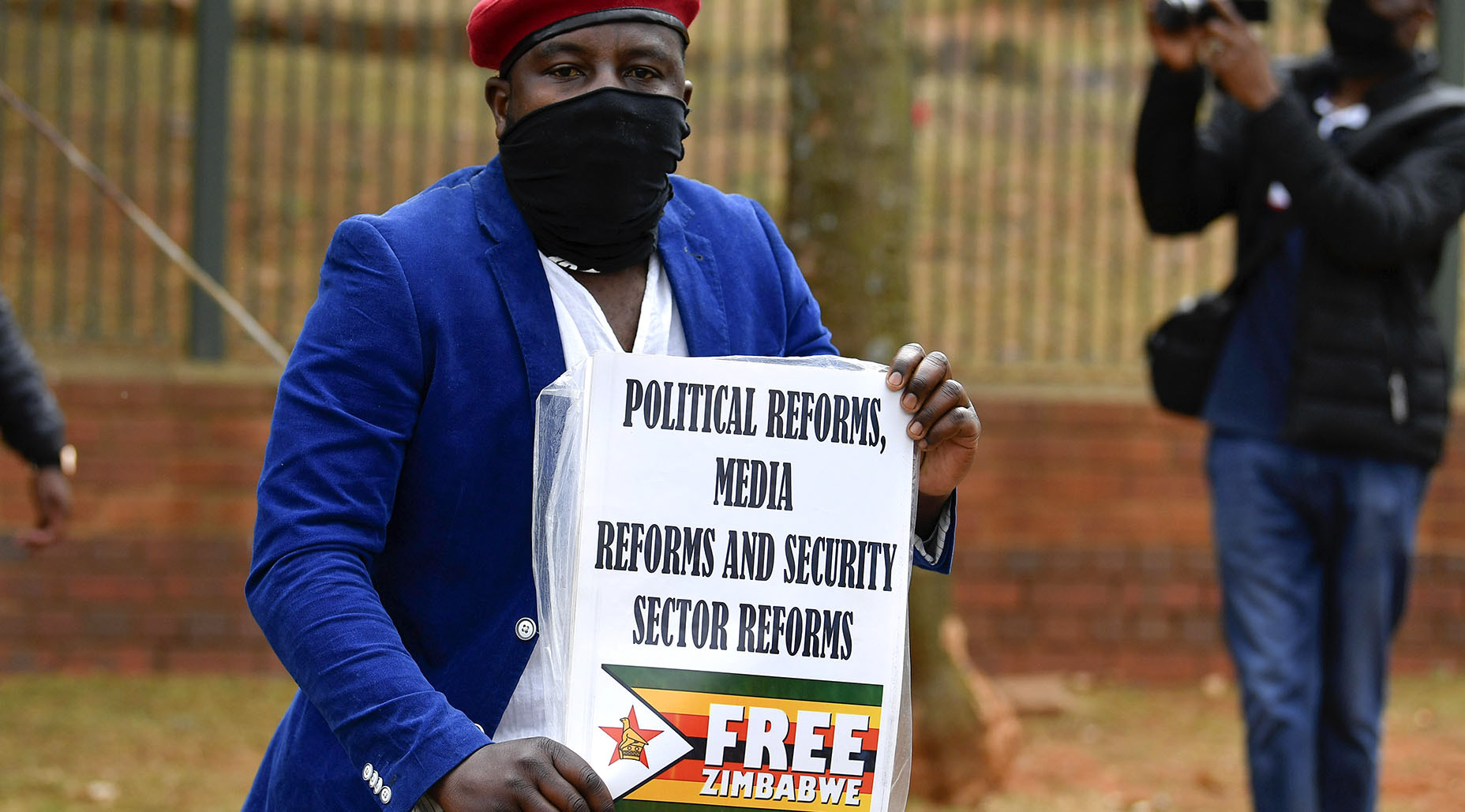Zimbabweans in the diaspora must be allowed to vote – and politicians’ paranoia is preventing it
- Get link
- X
- Other Apps
By Anotida Chikumbu and David Chikwaza• 9 July 2021

Members of the Not In My Name SA Movement protest in solidarity with Zimbabweans at the Zimbabwean Embassy in Pretoria on 7 August 2020. They were reportedly protesting against alleged human rights violations in Zimbabwe. (Photo by Gallo Images/Lefty Shivambu) Less
The view that Zimbabweans living abroad are misinformed about the situation back home is false. Poverty and unemployment brought about by economic hardship, bankruptcy and corruption forced them to look for better opportunities abroad.
Anotida Chikumbu is a historian and political economist. He is a PhD candidate and assistant lecturer in the Department of History at the University of Massachusetts Amherst. David Anodiwanashe Chikwaza is a researcher and scholar of political science and international development studies.
There are several theories about the Zimbabwean government’s failure to implement the diaspora vote. The one closest to the truth is that there is no political will to push for more widespread implementation because of the uncertainty about the number of Zimbabwean emigrants and their political preferences.
Calls for the extension of voting rights to Zimbabweans living and working in the diaspora are generating a highly competitive political atmosphere ahead of the 2023 general elections, making politicians paranoid about the potential impact of diaspora votes.
In 2018, President Emmerson Mnangagwa pledged to extend voting rights to millions of Zimbabweans abroad – a move that, if implemented, would answer a decades-long plea by the country’s citizens in the diaspora, who have consistently asked for the unconditional removal of restrictions to their right to vote.
However, it has become apparent that the promise was mere political grandstanding. The prospect of implementing the diaspora vote in Zimbabwe was recently rescinded in a statement by Zanu-PF’s acting political commissar, Patrick Chinamasa, in a press conference administered by 263Chat on 24 June.
Behind the times
This retrogressive stance by Zanu-PF is not only a drawback on democratic advancement in Zimbabwe, but also in Africa at large. A growing number of countries on the continent now recognise diaspora voting rights, notably Rwanda, Botswana, South Africa, Senegal and Kenya.


Zimbabwe continues to lag behind on the ladder of democratic advancement. Although section 67 of the constitution gives voting rights to every Zimbabwean, the Electoral Act of 2008 and the Electoral Regulations Act of 2005 restrict voting rights to Zimbabweans on official government assignments only. Any other Zimbabwean living abroad is required to physically present him- or herself at their registered polling station to cast their vote.
What explains the failure of the Zimbabwean government to implement diaspora voting?
There are basically three arguments put forward by the state to justify disenfranchising millions of Zimbabweans. First, it is argued that they are misinformed about the situation back home and are highly likely to vote naively. According to this view, the positive or negative consequences of their vote do not have a direct bearing on them.
Two critical questions are asked to this effect: whose future do citizens in the diaspora want to determine? Do they have a lived experience of Zimbabwe?
‘Too costly’
Second, it is argued that enfranchising the diaspora would unfairly outcompete Zanu-PF, whose capacity to campaign abroad is infringed by travel bans imposed on some of its party officials through sanctions.
Third, it is argued that the costs of operationalising the diaspora vote are huge, given how widely scattered the more than five million Zimbabweans living and working abroad are. Footing the bill for all the resources and logistics could exhaust budgets.
Are the Zimbabwe Electoral Commission (ZEC) officials and the government’s perspectives on or responses to the call for the diaspora vote justified?
Although there is some truth to these claims, the substance of the arguments disintegrates when subjected to critical analysis. The view that Zimbabweans living abroad are misinformed about the situation back home is overwhelmingly false.
Many people in the diaspora were forced into migration. The grim realities of widespread poverty and unemployment brought about by economic hardship, bankruptcy and corruption forced them to look for better opportunities abroad so that they could take care of their families.
Keeping the home fires burning
Some of these people may or may not want to return home, but most contribute to developments back home through remittances, skills and knowledge transfer, establishing connections and networks, and investing in business ventures or technology transfer. Some also have companies back home that employ thousands of people. Others support philanthropic causes in education and health.
According to the Reserve Bank of Zimbabwe, as of 2020 Zimbabweans in the diaspora sent home a total of $1-billion, the highest contribution made to the local economy yet, one which accounted for 5% of GDP.


The view that Zanu-PF is unable to campaign abroad because many of its leaders are under travel sanctions fails the test of logic. As of 5 February 2019, US targeted sanctions applied to only 84 Zimbabwean individuals, some of whom are not Zanu-PF officials or bigwigs. That is right – just 84 from a party of millions of supporters and thousands of officials.
Most importantly, these people are banned from travelling to the US and specific countries in Europe, not all the countries in the world. They are not prevented by anything from campaigning for Zanu-PF abroad. Moreover, these politicians were not put under sanction by accident. They are implicated in serious corruption and human rights abuse cases that have undermined democracy in Zimbabwe.
Tech to the rescue
Furthermore, the use of web technologies and social media platforms has gone a long way towards bridging distances between people the world over. Voting and campaigning are possible with appropriate technology widely available to people in the diaspora.
The view that operationalising diaspora voting is costly is limited in scope. It fails to consider the feasibility of electronic and postal voting. Recent studies have shown that the diaspora has access to digital technologies such as social networking sites. Therefore a technology-based election will be more advantageous for the diasporas than the people in the country. Although some researchers believe a hi-tech-based election can be expensive, the diaspora can subsidise and sustain a technology-based election.
Zimbabwe’s diaspora organisations, such as the Zimbabwe Diaspora Network North America, have over the years confirmed their support of this idea. Electronic voting can enhance citizen participation. Although others fear the possibility of hacking votes, it is important to note that electronic technology has been proven to be secure in several pilot projects and should provide a channel for diaspora-based Zimbabweans to vote. Electronic technology also can integrate biometric systems.
Elephant in the room
The Zimbabwean government remains doubtful of any feasible and effective model of diaspora voting in the sense that implementing such is tantamount to Zanu-PF reforming itself out of power. Even though the diaspora vote is critical, the bigger elephant in the room is that the ZEC cannot be trusted. Over the years it has failed to demonstrate its ability to administer a free, fair and credible election.
Even without the inclusion of the diaspora vote, Zimbabwe has had a series of troubled internal elections and this casts doubt on the proper management of the diaspora and positive political will. For instance, the Electoral Act has not been amended yet.
Although the implementation of the diaspora vote might take some time, increasing external or international pressure for inclusion would pose a significant challenge to despotic governments to extend voting rights. DM/MC
Comments
Post a Comment